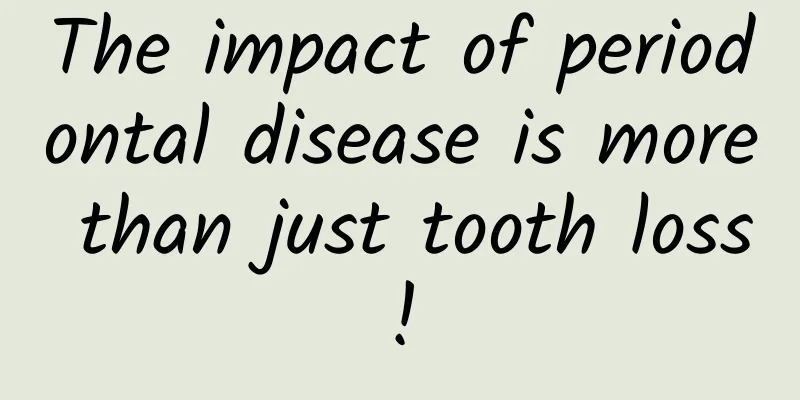The impact of periodontal disease is more than just tooth loss!

|
Author: Wang Qintao, Chief Physician, School of Stomatology, Air Force Medical University (Fourth Military Medical University) Chairman of the Periodontology Committee of the Chinese Stomatological Association Reviewer: Li Song, Chief Physician, Beijing Stomatological Hospital, Capital Medical University Director of the Chinese Stomatological Association The most direct harm of periodontal disease is tooth loss, which causes difficulty in chewing, slurred speech and affects the appearance. In fact, there is another hazard that is often overlooked. Because periodontal disease is an inflammatory infection, the toxins produced by bacteria may spread through the bloodstream, causing a reaction in our entire body's immune system, which can affect or aggravate diseases of many other organs. For example, diabetes, coronary heart disease, gastritis, aspiration pneumonia, etc., all have a certain relationship with periodontal disease. 1. What is the relationship between periodontal disease and diabetes? There are reports that when diabetes and periodontal disease occur simultaneously, after periodontal treatment, the blood sugar levels of many diabetic patients will decrease and their insulin sensitivity will increase. That is to say, under the same circumstances, if blood sugar cannot be controlled after taking hypoglycemic drugs, blood sugar will be more stable after periodontal treatment by using the same hypoglycemic drugs in the same dose. Figure 1 Original copyright image, no permission to reprint Therefore, diabetic patients should be reminded that when their blood sugar is not well controlled, they should check whether there is a problem with their oral cavity. Conversely, periodontal disease has now been clearly listed as the sixth complication of diabetes, indicating that there is a very close relationship between the two. Diabetic patients have a relatively low ability to resist infection, so their periodontal disease is generally more severe and develops faster. Therefore, in terms of treatment, it cannot be treated according to the general traditional chronic periodontal disease treatment. It should be selected according to the stage of diabetes. The treatment plan for periodontal disease is different for mild, moderate and severe diabetes. 2. What is the relationship between periodontal disease and coronary heart disease? Similar to the relationship between diabetes, coronary heart disease and periodontal disease also have a concomitant relationship. Because bacteria can enter various systems of the body from the mouth through blood circulation, and of course can also enter the cardiovascular system. Therefore, cardiovascular and cerebrovascular diseases are now taken very seriously because they pose a very high risk to humans. Generally, cardiovascular and cerebrovascular diseases have two major risks, one is myocardial infarction and the other is stroke. Both of these diseases have the potential to cause death or paralysis. An observational study lasting 18 years in the United States found that among patients with cardiovascular and cerebrovascular diseases, the incidence of stroke and myocardial infarction is two to three times higher among patients with periodontitis than among those without periodontitis. Therefore, this issue must be taken seriously. However, having systemic diseases or periodontal disease is not scary. You can face it positively and treat it positively. The measures and methods you take can be selected based on the actual condition of the disease. 3. What is the relationship between periodontal disease and gastritis? Periodontal disease is very common. Broadly speaking, its prevalence rate is as high as over 90%, so in many cases, it accompanies other diseases. We now know that a major culprit of gastritis or stomach disease is Helicobacter pylori, but we should not think that Helicobacter pylori is only found in the stomach. It is also found in the mouth, and can be found in dental plaque. Figure 2 Original copyright image, no permission to reprint There is a very interesting phenomenon that the number of Helicobacter pylori found in the plaque under the gums of patients with periodontitis is more than that found in patients with simple gastritis. So sometimes when gastritis recurs, don’t just think it’s a stomach problem, but also consider that it may be a problem with Helicobacter pylori in the mouth. Perhaps if you clean your mouth and do some very simple treatments, the treatment effect of stomach problems can be better. 4. What is the relationship between periodontal disease and aspiration pneumonia? Aspiration pneumonia is an infection caused by pathogens entering deep into the lungs. In fact, aspiration pneumonia is more common in patients who have been hospitalized for a long time or bedridden for a long time. Patients with such inconvenient activities have low activity levels, so their lung metabolism is also low, so some pathogens can easily enter the lungs and cause infection. For patients with periodontal disease, periodontal disease will cause local changes, including changes in some saliva and some proteases in the periodontal oral mucosa, which can then change some receptors on the surface of our mucosa. These receptors help pathogens, including pathogens in the lungs, to adhere to these receptors, and they will colonize in this place for a long time. When the body's resistance is low, these pathogens can easily enter deep into the lungs and cause deep infections. Superficial bacteria are easy to clear, but when there are infections in the alveoli deep in the lungs or in the bronchi of the lungs, they are difficult to clear, so it makes sense that diseases enter the body through the mouth. Therefore, we try to clean the bacteria in the mouth as much as possible, so as to reduce the amount of bacteria entering deep tissues, which can also play a role in preventing aspiration pneumonia. |
<<: A rare disease that needs to be seen: acute disseminated encephalomyelitis!
>>: Is moyamoya disease caused by smog? Understand moyamoya disease and detect and treat it early!
Recommend
How long does it take for the bleeding to fall off after induced labor?
How long does it take to deliver the baby after i...
Can I get tetanus while pregnant?
During pregnancy, the body is not mobile due to a...
Practice a healthy lifestyle and actively respond to severe cold weather
The temperature has dropped sharply recently, and...
What to do if a girl grows a mustache
Beards are a unique sexual characteristic of boys...
Women's belly is hard and bulging
In daily life, there are many women around us who...
What to do if you have dysmenorrhea due to a double uterus? Diet for dysmenorrhea caused by double uterus
Have you ever heard of female twin uterus? In fac...
What to do if women have loose teeth
In daily life, people's teeth often become lo...
The day from the first day of menstruation is the ovulation period
A perfect egg is released in every normal menstru...
What causes high testosterone in women?
High testosterone levels in women are caused by h...
How to treat severe uterine prolapse
Many women discovered that their uterus was prola...
Breast pain just after ovulation
There are many reasons for breast swelling, some ...
What causes hair loss after miscarriage?
When a woman suffers an unexpected miscarriage du...
What are the effects of smoking during confinement?
The confinement period is a time for women to rec...
Normal heart rate range for pregnant women
Pregnant women should pay special attention to th...
Symptoms of poor liver and gallbladder in women
We all know that whether men or women, we must pa...









